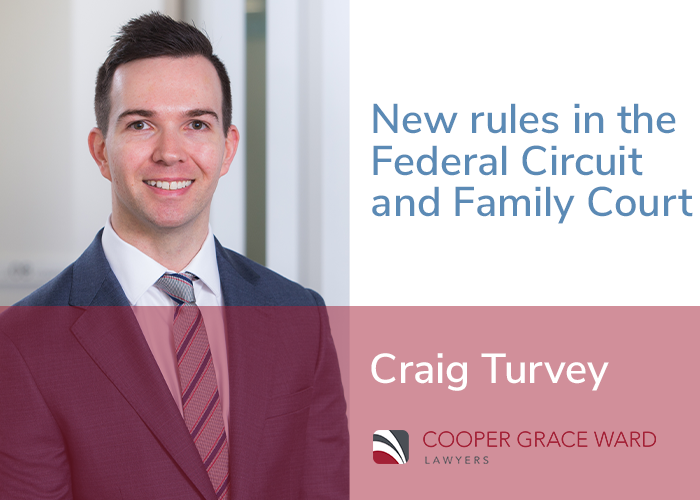In this edition of It depends, partner Scott Hay-Bartlem discusses whether your superannuation death benefit can be paid to your grandchildren. ...

In this video, CGW senior associate Craig Turvey talks about your financial disclosure obligations under the new Federal Circuit and Family Court Rules.
Hi, my name is Craig Turvey, and I’m a senior associate in the Family Law workgroup at Cooper Grace Ward. Today I wanted to talk to you about the Federal Circuit and Family Court rules that came into effect on the 1st of September 2021, and they replaced the family law rules from 2004 and the Federal Circuit Court rules.
Those rules were sort of amalgamated in different ways, and they operated depending on which court you were in and what the relevant issues were. They were confusing because there was sometimes a bit of overlap between the rules, and having different sets of rules in different courts was just generally confusing, particularly for self-represented people. So, the broad purpose of the new rules as a result of the amalgamation of the courts is to one; simplify things. But two; the overarching purpose is really to try and get people to resolve their matter in an expeditious way and without needing to go to court.
One of the biggest problems that the judges and people involved in the family law world identified, is that too many people were going to court having not disclosed properly, having not dealt with any of the preliminary sort of issues that you should address before you rush off to court. And so, they were finding that the court system was overwhelmed by these people pursuing orders about disclosure for initial court events, for preliminary issues that really, with a bit of foresight, they should have tried to address at an early stage, rather than running off to court and just getting a judge to try and make orders about that. So, it’s cheaper for people and much quicker for them to try and deal with those issues themselves directly without running off to the family law system and clogging that up. So, that’s really the overarching purpose behind the orders.
Practically most of the rules are generally the same in terms of procedure and process, but there’s an increased emphasis now on people going through the right steps they need to under the rules before commencing court proceedings, and we’ll talk about that in future videos. But something that’s important to keep in mind, too, is that there’s a big emphasis in the new rules on making cost orders against, not only parties in the proceedings, but lawyers as well for not complying with their obligations before they go to court. So, there’s just this really big push for people to exchange relevant financial documents or disclosure in parenting matters, to provide sets of orders that they would like if they went off to court to give people every opportunity to participate in dispute resolution and do all those sorts of things before running off to court. Now there’s still the same exceptions that there were before in that if something’s urgent or if there’s serious safety issues, for example, involving children and parenting matters, then you don’t necessarily need to follow those steps before going to court, but the general purpose of the new rules is to try and get people to do all of those things first, tick all the boxes, make every attempt they can to settle the matter sensibly, and then if they can’t do that, then they’re entitled to commence proceedings and go to court. And that’s really the main thrust of the new set of rules and the biggest difference between the new rules and the old ones.
So, if you have any questions about your obligations under the new rules, or if you’d like any assistance at all in terms of what needs to be done to commence proceedings, or to reach an early resolution of your matter, please don’t hesitate to contact me or one of the other family lawyers at Cooper Grace Ward.
This publication is for information only and is not legal advice. You should obtain advice that is specific to your circumstances and not rely on this publication as legal advice. If there are any issues you would like us to advise you on arising from this publication, please let us know.
Subscribe to our interest lists to receive legal alerts, articles, event invitations and offers.

Cooper Grace Ward acknowledges and pays respect to the past, present and future Traditional Custodians and Elders of this nation and the continuation of cultural, spiritual and educational practices of Aboriginal and Torres Strait Islander peoples.
Fast, accurate and flexible entities including companies, self-managed superannuation funds and trusts.